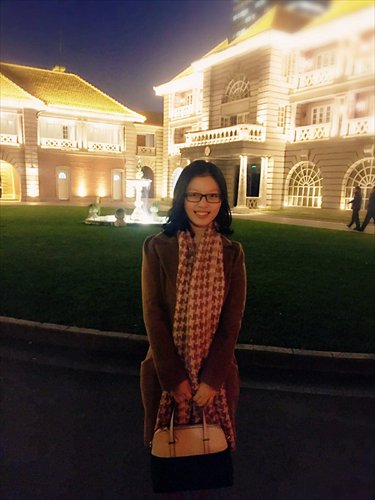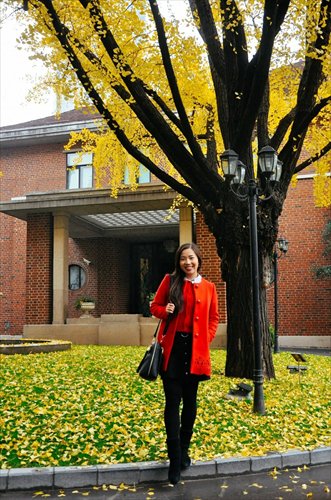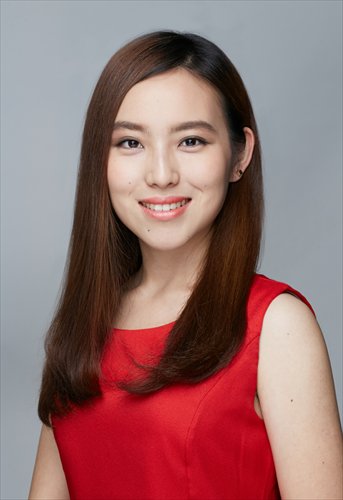HOME >> METRO SHANGHAI
The cream of the crop
By Huang Lanlan Source:Global Times Published: 2015-12-14 18:58:01
Elite Rhodes Scholarships granted to Chinese students for the first time

Rhodes Scholarships were established to help outstanding non-British students study at Oxford. Photo: CFP
On December 5 in Shanghai 16 finalists for the first Chinese Rhodes Scholarships assembled and, one by one, entered the room where nine examiners sat in a panel to choose the scholarship winners. The examiners were experts from different fields in China and abroad and included the manager of the scholarship program, Charles Conn, writer and journalist, James Fallow, and former basketball star Yao Ming.
When journalism student Zhang Chunying faced the panel she was surprised when Tang Meijie, the Rhodes China Program Director, asked her: "What is human nature?"
Zhang knew this was a big question and she struggled for a while to answer. "As a would-be journalist, I can tell you that there is neither absolute good nor evil in human nature. Some Chinese people stereotype officials and believe that most officials are bad people. But many of the grass-roots officials I have talked to are fine people."
Days later the four winners were announced and Zhang was named as one of the first group of Chinese Rhodes scholars. They are each entitled to two years of tuition at Oxford University, a package worth more than 50,000 pounds ($77,290) per academic year.

One of the first Chinese Rhodes scholars: Zhang Chunying Photo: Courtesy of Zhang Chunying
Heads of government
Named after the British mining magnate Cecil Rhodes, the Rhodes Scholarships were established in 1902 as postgraduate awards for outstanding non-British students to study at Oxford. Many Rhodes scholars have become heads of governments including the former US President Bill Clinton, and three Australian prime ministers (Bob Hawke, Tony Abbott and Malcolm Turnbull).
Zhang showed the Global Times a document from the Rhodes Trust which outlined the sort of people the scholarships are intended to reward. According to this document the selection committees are looking for outstanding leaders motivated to "fight the world's fight" and to "esteem the performance of public duties as their highest aim." These scholarships are intended for world leaders.
It's not easy to win a Rhodes scholarship. Just to apply candidates have to meet the English language proficiency requirements for Oxford (more than 110 out of 120 marks for TOFEL test or more than 7.5 out of 9 for IELTS test), have a GPA in the top 5 percent of their class and have GRE or GMAT certificates. Then they face three rounds of interviews.
The Rhodes Scholarships are widely regarded as the most difficult scholarships in the world with an admission rate of 0.7 percent. According to the Shanghai media website thepaper.cn, each year more than 120,000 college students worldwide apply for the scholarships but only about 80 are accepted.
In China, this year the Rhodes Trust received more than 1,000 applications. Zhang got her application in just eight hours before the deadline on October 9. "Actually I was very hesitant about it," Zhang said. "I was busy with my studies and felt very uncertain."
At that stage Zhang was studying in the M.S. Journalism Program at Columbia University. She was surrounded by talented and experienced fellow students and the 23-year-old, with no work experience, was pretty insecure. "My news writing was very immature compared to my classmates," she said.
She eventually submitted her application for a Rhodes scholarship after being encouraged by her undergraduate tutor, Zhou Shengchun - "I didn't want to let him down."
Every scholarship candidate has to write a 1,000-word personal statement and Zhang wrote about being a journalism enthusiast and enjoying talking to people. In 2013 on a flight from the UK to China, Zhang met a mother who told her that, although she had had a daughter, she then really wanted a son but could not do this because of the then one-child policy.
The woman moved abroad and had two sons and another daughter in Spain but when she wanted to move back to China, she discovered her children would have no hukou (household registration).
Without hukou in China people are not entitled to public education, employment or allowed to buy property. "The woman I met on the plane was just one of those troubled by China's 30-year-old one-child policy, and there must have been millions of people born without hukou over the past decades," Zhang said. "I'm interested in this group of people, and would like to listen to and share their stories."

One of the first Chinese Rhodes scholars: Zhang Wanyu Photo: Courtesy of Zhang Wanyu

One of the first Chinese Rhodes scholars: Ren Naying Photo: Courtesy of Ren Naying
Pitching a story
In her final scholarship interview the noted American journalist James Fallow asked Zhang to pitch a news story idea and she began to talk about the heihu - the people in China without a hukou.
This no doubt helped her win and the selection committee commented favorably on her passion for journalism and dedication to Chinese society.
Zhang Wanyu is one of the other new Rhodes Scholarships winners and she has a similar dedication to China's vulnerable groups especially migrant workers. Twenty-two-year-old Zhang Wanyu is a final-year undergraduate law student at Peking University and she told the scholarship panel that her goal was to provide legal aid to this vulnerable group. "During my internships and practical work I came across migrant workers who hadn't been paid for years. Sadly at present the rights of these people are barely protected."
In June Zhang Wanyu was a volunteer at a nonprofit summer camp in Sichuan. The camp looked after children between 13 and 17 whose parents were migrant workers suffering from silicosis (black lung disease).
"At the camp a feeling of utter helplessness washed over me," she told the Global Times. She knew that while lots of migrant workers suffered from this disease few had sought help from the courts. "When these kids asked me why the law couldn't help their parents I couldn't answer. I was devastated."
After Zhang Wanyu was told she had been accepted for two Skype interviews for the scholarship application, she gave up her internship at a Beijing law office to concentrate on preparing for the interviews. She contacted a former Rhodes scholars she had met in Stanford University to ask about possible questions.
The Skype interviews were not so difficult for 22-year-old Ren Naying, a final-year undergraduate student at Tsinghua University and now a scholarship winner.
"The interviewers asked me questions like what were my hobbies and favorite books," the English major student told the Global Times. "They also asked about the situation of the LGBT (lesbian, gay, bisexual and transgender) group in China."
For Ren this was not a difficult question. As a volunteer of the nonprofit Beijing LGBT Center, she had met many LGBT people and helped organize LGBT events including psychological consultations, group discussions and fundraising activities. "I have LGBT friends who are depressed about their sexual orientations," she said. "Chinese students are not allowed to date before graduating from high school, and they know little about sex and gender. That is not good for their growth."
Ren has been trying to help sexual minority groups in China. Earlier this year, she, and another four college students, founded the China LGBT+ Youth Network, an online platform for young LGBT people to communicate on.
At her final scholarship interview in Shanghai, one panelist asked Ren what would she do after sexual equality had been completely achieved in China?
"It was an interesting and challenging question," Ren said. She realized the question involved many complicated issues including same-sex marriage and open sexual relationships. "I said that I actually didn't think China could solve all these issues within a short period of time. Rather than imagine what the days after sexual equality was attained would be like I would prefer to solve the issues step by step."

One of the first Chinese Rhodes scholars: Gong Chenzhuo Photo: Courtesy of Gong Chenzhuo
Travel experience
The only male scholarship winner was Fudan University graduate Gong Chenzhuo and it was his travel experience that apparently impressed the selection committee. "I've been to 28 countries in six continents," he said. "As a student majoring in international politics, I believe that the best way to know about the world is to see and experience it in person."
In the summer of 2013 Gong participated in a program organized by the international nonprofit student organization AIESEC in Tanzania, where he became a voluntary English teacher in the country's second largest city, Mwanza. "It was an underdeveloped city with few buildings more than three stories high," Gong told the Global Times. "There was no luggage conveyer belt at the airport - workers gave the cases to passengers by throwing them through a hole on the wall."
The school was even more primitive. There were 80 students crowded in one classroom, sharing 10 textbooks. "The students' English was so poor they could barely say a complete sentence," Gong recalled. He found it difficult to communicate with them and taught with the help of local teachers.
But he eventually enjoyed his days in Tanzania. The school had no playground, and students played with "footballs" made from old newspapers. Some children were barefooted. "But they always smiled," Gong said. "I really miss the days when they happily played with a football I brought from China on a patch of waste land."
At present he is working in Tanzania as a trainee in a UNESCO program, helping establish radio stations in rural areas. "We are trying to do something meaningful through the broadcasting system, like publicizing information about AIDS and gender equality."
During the scholarship interviews Stephan Leonard, an assistant professor with the Renmin University of China, asked Gong about his advice for the Chinese business in Africa. "I answered honestly that China's businesses should not just focus on making money in Africa," he said. "I suggested they do more to help local communities and fulfill their social responsibilities."
The first Rhodes scholars from the Chinese mainland all come from the country's top universities and this has provoked some controversy with many online criticizing a scholarship which only recruits students from top institutions and is unfair to students in rural areas. "Why not give the money to students who live in poverty?" some wrote on Weibo.
Better informed
Simon Rabinovitch is the secretary of the Rhodes Scholarships for China and he admitted that candidates from top universities had advantages over their peers. "Most students from key universities are better informed and have better language abilities," he told thepaper.cn, adding that this year few rural area candidates had been shortlisted. "Children in poor areas do enjoy fewer opportunities for various reasons. Nonetheless, the Rhodes Scholarships has no restrictions on candidates' universities or regions. I'm looking forward to seeing more candidates from China's poor areas in the future."
The four winners have their own thoughts on the matter. "Many people think that most Rhodes scholars are from wealthy families," Gong said. "Even though I don't agree with this, I accept that this is perhaps true under China's current situation."
In future Gong wants to found a nonprofit organization to help rural students as well as other vulnerable groups in China. Zhang Wanyu has a similar aim - offering legal aid to the country's vulnerable people especially migrant workers and their children.
"A Peking University lecturer once said that we (PKU students) were lucky to enjoy the country's best educational resources," she said. "Unfortunately, there are still many talented and hardworking students who can't get a good education because of inequality. I hope to improve this one day."
Posted in: Metro Shanghai, City Panorama